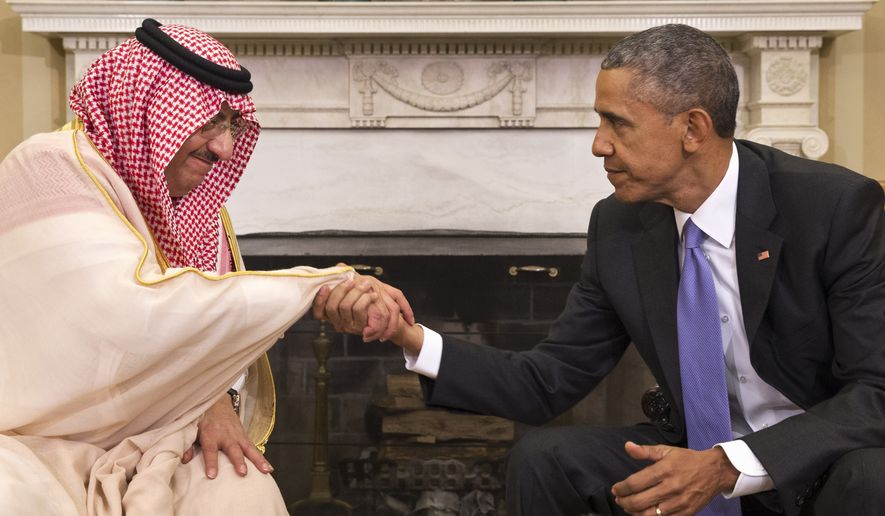Despite the absence of key Arab leaders, President Obama forged ahead Wednesday with a summit of Persian Gulf states and said the U.S. is focused on deepening security ties in the region despite deep concerns about Mr. Obama’s proposed nuclear deal with Iran.
Mr. Obama opened the summit by meeting with Crown Prince Mohammed bin Nayef and other Saudi Arabian leaders who traveled to Washington in place of Saudi King Salman. The Saudi leader joined the heads of Oman, Bahrain and the United Arab Emirates in skipping this week’s gathering, which will continue Thursday with a series of meetings at Camp David.
Riyadh and other Sunni Arab capitals are deeply uneasy about the Iran deal, the region’s pre-eminent Shiite power and one that has vied with Saudi Arabia in a series of proxy skirmishes. The Arab leaders have privately pressed for more binding security guarantees from Washington as a price to not undermining the Iran deal, guarantees that Mr. Obama has refused to give.
While the White House has spent much of this week defending the summit amid a series of snubs by Arab leaders — including Wednesday’s revelation that Bahrain’s King Hamad bin Isa al-Khalifa is skipping the meeting in order to attend a London horse show — the president stressed that the U.S. can make important progress over the next 48 hours. During his meeting with Saudi leaders, the president said the fight against the Islamic State, also known as ISIS or ISIL, and the ongoing civil war and humanitarian crisis in Syria will be central issues during the summit.
“They came in as a critical component of our coalition in the fight against ISIL, and I’m sure that we’ll have opportunities to discuss as well the progress that’s been made in the fight against ISIL in Iraq, as well as the continuing crisis in Syria, and the importance of us addressing not only the humanitarian crisis but the need to bring about a more inclusive and legitimate government there,” Mr. Obama said during brief remarks in the Oval Office, flanked by Crown Price Mohammed and other members of the Saudi delegation.
White House officials said a key objective of the summit is to further U.S. security cooperation with Saudi Arabia and other allies in the region. White House press secretary Josh Earnest said American support is central to the “very existence” of many Middle Eastern nations and that bolstering that support is a top priority for the president.
SEE ALSO: Obama pressed to raise human-rights abuses in Gulf nations
“The national security of the United States is enhanced by the strong counterterrorism and intelligence-sharing relationship that we have with many countries, with each of these countries,” Mr. Earnest told reporters. “And they understand that the strong relationship that they have with the United States is one that’s worth investing in and one that’s worth maintaining. And that will be the essence of the conversations: What can we do to modernize and deepen that security cooperation?”
But analysts say Mr. Obama must proceed cautiously. Many Americans are wary of further U.S. commitments in the Middle East, and new long-term, formal promises to protect Persian Gulf states may prove unpopular with many voters, said Christopher Preble, vice president for defense and foreign policy studies at the libertarian Cato Institute.
“The issue isn’t what is said immediately after the summit but what is done over the longer term, and I think there are some legitimate concerns,” he said. “If there were a new formal commitment on the part of the United States to defend some of these countries, that would be problematic. We’ve been embroiled in that region for a long time with little benefit. Most Americans are reluctant to become even more embroiled.
As for the apparent snubs, some Arab leaders reportedly are not attending the summit because of poor health.
But that apparently is not the case for Bahrain’s King Hamad. Officials in Bahrain said the king has had a long-standing commitment to attend a London horse show with Queen Elizabeth.
King Hamad’s scheduled attendance at the horse show was first reported by Reuters.
SEE ALSO: King of Bahrain snubs Obama summit for horse show: report
King Hamad still intends to “further bolster friendly relations” with the U.S., Bahrain Foreign Minister Sheikh Khaled bin Ahmed al-Khalifa told Reuters in a statement.
While there may be policy disagreements between the Obama administration and some Middle Eastern leaders, some specialists say Americans shouldn’t read too much into King Hamad’s snub.
“It could just be the King of Bahrain loves his horses,” Mr. Preble said.
• Ben Wolfgang can be reached at bwolfgang@washingtontimes.com.




Please read our comment policy before commenting.